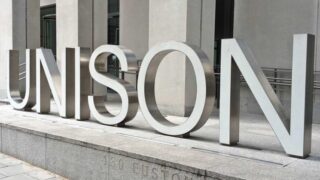UNISON general secretary Christina McAnea was joined by an all-female panel of trade unionists at the special delegate conference’s international rally which, for the first time, took place online.
Delegates heard harrowing accounts of the threats faced by those challenging the legitimacy of authoritarian regimes, and leaders using the COVID-19 crisis as cover to tighten their grip on power.
Ms McAnea opened the rally by providing a sobering overview of the oppression and violence meted out to trade unionists and vulnerable communities around the world in the wake of the pandemic – from Israel’s bombardment of Gaza and the government’s failure to provide vaccines to the Palestinian people, to Brazil’s “far right racist, misogynist, homophobic, coronavirus-denying president” who stood by as hundreds of thousands of people died of the virus.
Colombia, Turkey
Ligia Ines Alzate, from the national executive of Colombia’s TUC, the CUT, told delegates how Colombian authorities mercilessly suppressed a peaceful protest against economic inequality and human rights abuses.
She described how on 20 April the demonstration she helped organise descended into bloody violence when police opened fire on protesters. More than 60 people were killed and over 1,000 arrested.
Despite the violence, Ligia has accepted that the only way to end the killing, help the poor and discover the fate of the ‘disappeared’ is to negotiate with a regime that “doesn’t value the rule of law or the lives of its citizens.”
From Turkey, Eylem Eroglu, executive committee member of the Turkish SES union, outlined the lengths hardline President Recep Erdogan has gone to maintain control, even as COVID-19 ripped through the population.
“My union has been fighting for the rights of health workers since the beginning of the pandemic,” she said. “The government’s mismanagement of the crisis has cost the lives of 420 health workers.
“About 50,000 people have died and more than five million are infected with the virus. Those who criticise the government are branded terrorists and arrested.
“Health workers are exhausted, but the government has banned vacations and even stopped staff resigning. Accepted universal standards of political behaviour no longer apply in Turkey.”
Brazil, Myanmar
Across the world the rise of the far-right strongman leader has gathered pace. And the coronavirus crisis has provided them with an opportunity to show how strong they are.
Brazil’s President Jair Bolsonaro has become the poster boy for COVID denial. He’s presided over 500,000 deaths, refused to buy vaccines for his citizens and infamously told Brazilians to “stop whining” about COVID-19, as he criticised measures to curb the virus, even as cases and deaths increased.
Despite his stranglehold on power, Luba Melo, the women’s secretary of SINSEP – part of the municipal workers federation of the CUT, Brazil’s TUC – believes international union support will tip the balance in favour of the Brazilian people and drive Bolsonaro out of office.
“We want the UN to condemn this genocidal government for the denialism that has cost so many lives. With the support of UNISON and the international union movement we will win the 2022 election,” she said.
“We know Bolsonaro may turn to the military to keep power, but we hope the weight of international support will mean we win back our beautiful country and the people will be able to smile again.”
In Myanmar, trade unions are at the heart of the opposition to the generals who seized power in a coup in February. But standing up to the junta has come at a cost.
“Trade union offices are being raided by military forces and local NGOs have been declared illegal,” said Khaing Zar Aung, founder and president of the Industrial Workers Federation of Myanmar.
She described the appalling conditions workers are having to endure under military rule: “People work all the time because the junta has banned staff from taking time off. They can’t see their families or take relatives to the hospital if they’re sick.
“The families of union organisers are being forced out of their homes as punishment for defying the military and taking part in acts of civil disobedience. But we will not obey them.”
In a defiant message, Khaing called on the international community to join the fight for freedom. “The military hasn’t been able to take full control of the country because we are fighting back.
“But the Myanmar people cannot win this battle without the support of governments and you all.”
Palestine
“The [most recent] repression has been our lived reality for over 73 years,” she said. “Forced displacement and the theft of Palestinian property is the norm, not the exception.
“Over the past five years over 11,000 Palestinian homes in the south of Israel have been demolished. More than 100,000 people will be facing forced displacement to make way for Israeli, Jewish-only residential areas. Rarely does a day go by in Palestine without someone being killed.”
Despite the relentless subjugation of the Palestinian people, in recent weeks Riya has seen the emergence of hope, and credits international support in part for the change.
The role of the international union movement as an agent for justice, holding power to account, has never been more important. And the point was not lost on Christina McAnea, who reaffirmed UNISON’s support for sister unions across the globe.
Ms McAnea promised delegates that UNISON would continue to fight for workers’ rights wherever they were threatened.



